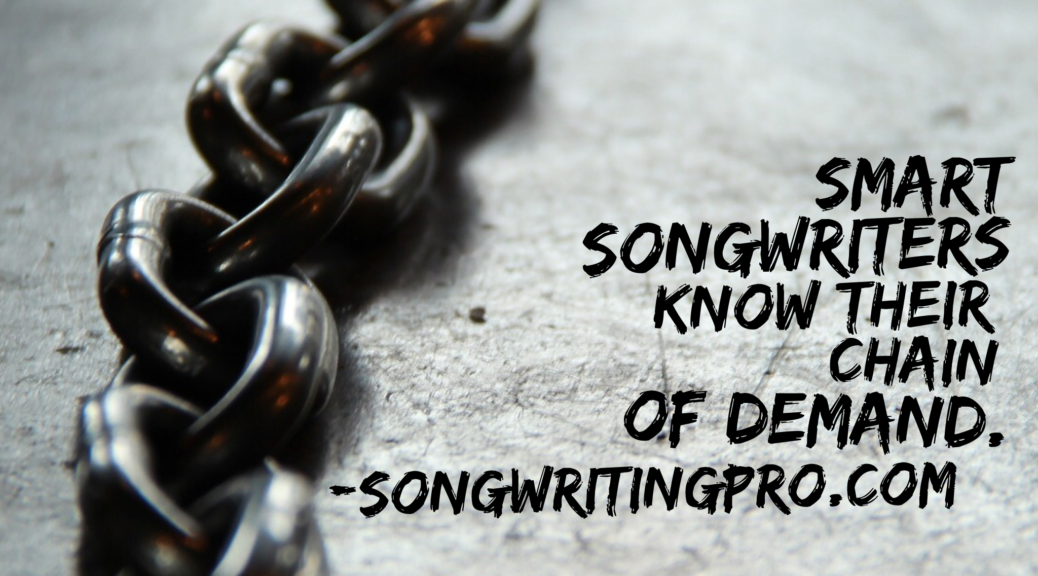If you write songs and aspire to get cuts- to get them recorded in a way that makes you money- then you’re in the music business.
Notice, I didn’t say you hope to get into the music business. I didn’t say you aspire to get into the music business. You ARE in the music business. Congratulations!
And now that we’ve established that you’re a small business owner, let’s talk business.
________________________________
To BE a pro, you need to THINK like a pro, and this FREE ebook will help transform your thinking, your songwriting, and your success. Get it today!
_________________________________
Businesses make money when they make a product or service available, and somebody wants it enough to pay for it. If there is no demand for what you supply, no money changes hands. If there is great demand, but you don’t supply the product they want, then no money changes hands.

In the music business, it gets a little complicated since we, as songwriters, don’t usually go direct-to-consumer with our product (our songs). Songwriters compete to get a middleman (the artist) to present our product (our song) to the consumer. If that artist gets the consumer (the listener/fan) to buy the song, money changes hands and some of it eventually gets to us in the form of royalties.
This brings us to the “Chain of Demand.”

The listener wants songs that move them in the way they want to be moved.
Mostly, it’s songs that make them feel good; sometimes songs that make them sad. If radio plays songs they like, they keep listening. If not, they may switch to another station or listen to music on some other device or service (Spotify, smartphone, etc.).
Radio wants songs that keep the listener listening.
The more listeners a station has, the more they can charge for advertising, which is how they make money. Therefore, radio wants songs that keep the listener feeling good and listening through the commercials.
The artist wants radio airplay.
Airplay is still the main channel by which the audience hears new songs. The artist wants a hit so their song is exposed to more listeners, listeners who may buy the single, the album, a concert ticket, a t-shirt, etc. Therefore, the artist wants songs that they believe will both get played on radio and will motivate the listener to buy something from that artist. The artist also wants songs that fit them artistically.
The songwriter wants artists to record their songs.
They also want those songs to get played on the radio, and for the listeners to like those songs enough to buy them.
Easy, huh? Yeah… about as easy as threading a needle from across the room with the ceiling fan on.
Knowing this reality should make a big difference in YOUR music business. Applying the chain of demand will help you write market-smart songs: songs that have a competitive advantage in the market.
If you want to learn more about how to write songs that will get you noticed in the music business, I have a great opportunity for you.
Every Monday night in April, I’m hosting The C4 Experience. It’s an exclusive, live online event where I help 10 writers like YOU create explosive growth in your commercial songwriting. I want you to win, and I’m going to help you write songs that artists want to sing, radio wants to play and fans want to hear.
CLICK HERE TO GET ALL THE DETAILS AND RESERVE YOUR SPOT IN THIS EXCLUSIVE EVENT!
God Bless and Enjoy the Journey,
Brent
Brent Baxter is a hit songwriter with cuts by Alan Jackson, Randy Travis, Lady Antebellum, Joe Nichols, Gord Bamford, Ruthie Collins, Ray Stevens and more. He’s written a top 5 hit in the US, a #1 in Canada, and a top 10 in Texas. His songs appear on 5 industry-certified gold & platinum albums & singles… so far. He also hosts a top-rated songwriting and music business podcast called, “The C.L.I.M.B.” which can be found on iTunes or your favorite podcast app.




